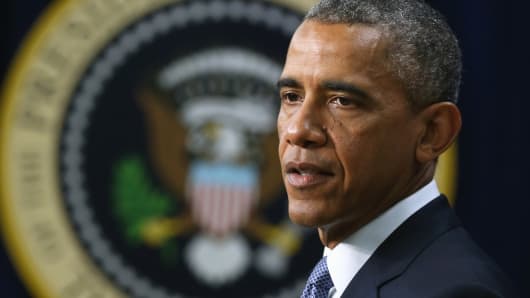What's missing from any of these verbal jabs is anything real. No CEO, hedge fund manager, or "fat cat" is actually ever named. No specific action on their part is ever actually denounced.
Read MoreObama says CEOs should quit complaining: Economist
You can see this tactic's allure. Most Americans aren't rich, aren't CEOs, and certainly aren't "fat cat" hedge-fund managers. Bashing them presents no real political risk to any politician and it should help any Democrat trying to appeal to a growing progressive base in the party.
It's basically just election-style sloganeering, and frankly it's beneath the dignity of the office of the President of the United States. It's something that should be left to low level members of Congress or the faceless narrators in campaign ads.
President Obama did single out of the Koch Brothers in 2012 for using their wealth and influence during that year's election. But In that case, there was still a straw man element to the attack. It's still not clear what the president wanted the Kochs to do. Was he demanding they pull their money out of politics? Did he want to take away their right of Free Speech? Did he want them to start donating to his campaign? Beyond the small points he may have scored bashing a pair of billionaires, none of that was never made clear.
Read More CEOs to Obama: You still don't get it
Presidents, even in re-election campaign mode, shouldn't bash non-convicted or wanted criminal Americans in public. And when they enact policies that deliberately punish certain Americans, they really don't talk about it publicly.
But there was one notable exception. In April 1962, President John F. Kennedy got real "up close and personal" with U.S. Steel CEO Roger Blough. After Blough and the other major steel company executives raised steel prices by $6 a ton, Kennedy exploded in an historic televised news conference. The president's entire pre-question comments were devoted to attacking Blough's decision; bashing it as unpatriotic and irresponsible. He contrasted this picture of corporate greed with the plight of American servicemen in Berlin and Vietnam at the time saying:
"… the American people will find it hard, as I do, to accept a situation in which a tiny handful of steel executives whose pursuit of private power and profit exceeds their sense of public responsibility can show such utter contempt for the interests of 185 million Americans."
Privately, JFK got even nastier. According to Arthur Schlesinger, he said: "My father always told me that all businessmen were sons of bitches, but I never believed it till now."
Read MoreObama to Republicans: 'Stop hatin' all the time'
JFK won the battle in the short run as Blough reversed the price increase a few days later. But over the next year or so, U.S. Steel and the other companies successfully re-introduced the price increases incrementally and the Kennedy administration felt it was out of ammunition to do anything about it.
Even though President Kennedy's decision to so publicly and angrily single out a CEO ultimately failed, at least his battle was over a specific move and he was more than willing to name names and cite the specific action he wanted reversed. Judging by his polling data at the time, the move did not give him a boost with the voters. But right or wrong, JFK's decision was clearly part of the administration's focus on controlling inflation and not scoring cheap political points. And he didn't stoop to calling anyone a "fat cat."
The most successful U.S. presidents, from Abraham Lincoln, to FDR to Ronald Reagan, have always rallied the American people to join together to solve problems without harboring hate, resentment or blame. JFK may have failed to do that, but at least he was looking beyond the polls.
Read MoreWhat the GOP should be doing now: Kudlow
It's hard to say the same for President Obama, who doesn't seem able to talk up a single policy proposal without pitting it against real or imagined domestic enemies. That may have worked for him at the ballot box in 2008 and 2012, but it hasn't worked for America, the economy, and all of us non-fat cats out there.



